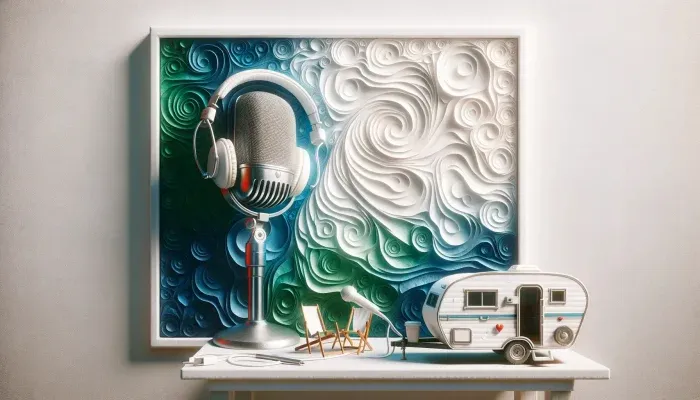The Importance of the Podcast Trailer

Let me tell you a secret about trailers. I have always hated them. They’re a distracting extra task in the middle of your production schedule. You’re already so busy making a show — you don’t want to slow down and do a bunch of extra work to convince people to listen to the show you’re trying to make. You just want to make the show! Do you have a headache yet? This has generally been my state of mind when faced with the task of producing a trailer for a new series or season. Annoyed and frustrated.
So why bother? There is a very practical reason for it. From a purely technical standpoint, a lot of people setting out to make a podcast for the first time may not realize that you need to have a piece of audio in order to set up your RSS feed. It can take a little time for the feed to be approved and available across all platforms. And when it’s time to publish your first episode, you want to make sure that it will show up across all the platforms without any glitches. So a trailer is a good way to make sure your feed is set up properly. Plus, research shows that podcasts that have trailers tend to do better than podcasts that don’t.
But beyond that, last month I discovered another reason that trailers really can be worth the trouble. The real purpose of making a trailer is to court an audience for your show. The cute note passed to your crush. The casual coffee before they agree to a dinner date.
So I was in the middle of production of How to Fix the Internet and I had to — you guessed it — make a trailer for the new season. I knew it was coming. I was dreading it. But then when I started reluctantly (of course) working on it, I discovered something extremely surprising — I was enjoying myself.
I intentionally scheduled myself to write the trailer after we had a few interviews for the new season recorded already, so that I would have as much tape as possible to play with.
I was in the thick of production, a hectic time when you’re trying to juggle several different episodes at different stages — you’re chasing one guest, writing a q-line for another, editing an interview you recorded the other day, giving notes on another episode to the sound designer. It’s easy to get lost in the chaos, and hard to stop and sit and listen.
But sitting down and listening to what we had recorded so far was an enormous pleasure. How to Fix the Internet is an interview show that features really fascinating conversations with really smart people. And listening to those conversations made me excited about the show again, proud of what we were making, and eager to share it with the world.
And that’s the real purpose of a trailer anyway — to help get listeners excited about what you’re making for them.
You want to get listeners to fall in love with your show. And while you’re figuring out how to do that, you might just fall in love with your show all over again too.
So making the trailer isn’t just a hassle (I’m not going to lie, it is still kind of a hassle) — it’s a gift.
It’s an opportunity for you to identify your best tape, and to articulate why the show you’ve been working so hard on is going to be worth listening to. It’s your elevator pitch, the part of your workday you can’t shut up about at home or with friends — it’s the reason you wanted to make the podcast in the first place.
One of my favourite shows of last year hooks you right away. In the first 30 seconds of this trailer for Ghost Story, Tristan Redman sets up how the story he’s investigating might just get him disowned by his wife’s family. The personal stakes are high– plus there’s murder and maybe a ghost. Who isn’t going to listen to that?
But what if you need to release a trailer before you have enough — or any — tape to work with? That’s where creative bravery — and a little ingenuity — comes in.
You can actually have a lot of fun with the trailer. Here are a few playful examples from recent years:
If you have a big enough name, you can get away with mocking the very concept of a trailer, as the team for Jon Stewart’s podcast did here.
Jennette McCurdy, host of the podcast Hard Feelings, is similarly antipathetic towards trailers — and she leaned right into her resentment to record hers.
If you don’t have a big name, and you don’t have any trailer-appropropriate tape yet — sit and think about your show. Try to remember back to when you were first daydreaming about — why did the idea excite you? What made you stick with it? Why would YOU want to listen to it? That’s where you should begin with your trailer.
Oh yeah, and try to keep it short.
LINKS:
Sign up for the newsletter for the latest brand storytelling and podcast inspiration, insights, right in your inbox, every two weeks. We promise to never spam you.
